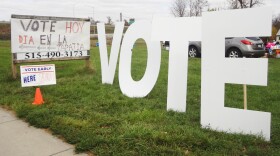Following last week’s runoff election in Cedar Rapids, there’s interest in rethinking how the city chooses its mayors. The runoff was triggered when no candidate won 50 percent of the vote plus one during the regular election, forcing the top two to face off again. Those top two candidates have both voiced support for reassessing the runoff process, as other communities have done.
After the polls closed on Nov. 2, former television journalist and nonprofit leader Tiffany O’Donnell had a more than 3,000 vote lead in the Cedar Rapids mayor’s race. But because she didn’t win 50 percent plus one, it wasn’t enough to win outright; the race had to go to a runoff.
What followed was a three week blitz of trying to raise more money, reconnect with voters and get them to the polls in spite of the busy Thanksgiving weekend. The brief runoff calendar bookended the holiday, with Election Day falling on Tuesday Nov. 30.
The runoff is estimated to have cost Linn County some $80,000.
Ultimately, O’Donnell came out on top in the runoff too. Even though the process worked out for her in the end, O’Donnell has advocated for the city to rethink the runoff provision.
“The runoff is a challenge on many fronts. And it’s expensive for the city. I think they said something like $80,000? I can think of a lot of ways we could use that,” O’Donnell said. “So I look forward to having conversations about that. It’s certainly not something that the mayor can do unilaterally. I just feel like, having been on the frontlines of this, I feel like I could offer a perspective.”
Amara Andrews, an attorney and TrueNorth employee who ultimately came in second, has also said the runoff is worth rethinking, though she has acknowledged that as the top two vote getter, the provision helped her stay in the race longer.
Still, Andrews says the runoff was a challenge for candidates and voters alike.
“It was difficult for the candidates. We have a holiday right in the middle. And so there’s that difficulty,” Andrews said. “But more importantly for voters, I mean it was almost impossible to submit an absentee ballot. You have people traveling. And so if you’re traveling and you couldn’t submit an absentee ballot, then you’re really out of luck.”
Voters had until Nov. 15 to request an absentee ballot request. Early voting was available through Nov. 29 ahead of the Nov. 30 election.
Last year, the city of Des Moines did away with its runoff provision and shifted to a winner-take-all system, with local officials citing similar concerns about the cost of administering the second election and the confusion it can cause voters, especially during the busy holiday season.
Both O’Donnell and Andrews have questioned whether Cedar Rapids should move to a partisan primary, with Andrews saying she would need more information and O’Donnell emphasizing what she sees as the importance of keeping the local race nonpartisan. Still, both say they think improvements can be made, including making the election process more accessible for first-time and minority candidates.
“I do think we can improve this process,” O’Donnell said. “And I’m looking forward to having a conversation after all is said and done about how we can make some improvements.”





